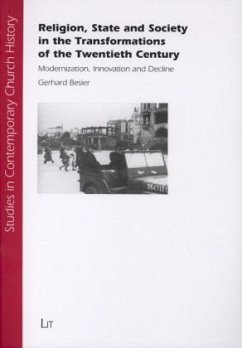The established churches and religious communities were deeply involved in the transition processes of the twentieth Century. Their behavior did not increase its credibility in Europe yet. Churches and their pastors played an important part in the implementation of the "political religion" of nationalism. During the National Socialism as well as during the Cold War Christian religious communities were often used as political pawns. In both cases, National Socialism and Communism, the church leadership worked closely with the repressive Systems and tried to win the people over to the dictatorships' ideologies. That's why the history of the religious transition process is - with a few exceptions such as that of Poland - a history of the de-christianizing of Europe. This is just one of many ways in which Europe differs from the United States.

